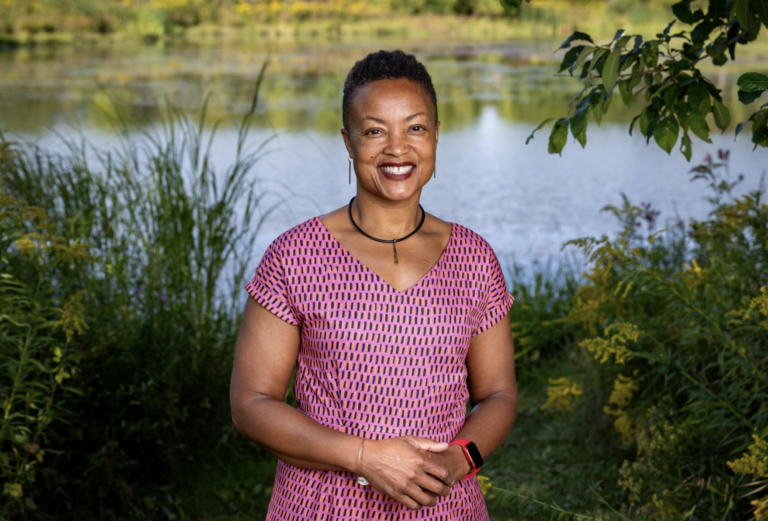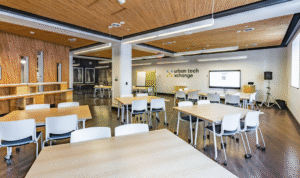
- Kim Kisner
- Education
- 11/19/2024
Shalanda Baker Discusses Goals and Collaborative Approach

This month, Shalanda Baker began her role as the University of Michigan’s inaugural Vice Provost for Sustainability and Climate Action. In this role, she will lead U-M’s interdisciplinary efforts on sustainability, focusing on integrating environmental topics into academic curricula, fostering critical research, and advancing the university’s sustainability goals.
Previously, Baker served as the Director of the Office of Energy Justice and Equity at the U.S. Department of Energy, where she focused on advancing energy justice initiatives. With a background in law, energy policy, and environmental equity, she is also known for her academic work and advocacy for integrating justice into energy policy.
SBN Detroit spoke with Baker to learn more about her vision, goals, challenges, and the collaborative approach she plans to bring to this new role.
Q: As the first person to hold this new position, how do you envision setting the foundation?
A: I’m spending a lot of time getting to know the university and the professors engaged in sustainability. I have two direct-report units, the Matthaei Botanical Gardens & Nichols Arboretum and the Graham Sustainability Institute. My initial focus is on understanding how all of the sustainability pieces across our large, decentralized campus fit together. Moving quickly is essential if we’re going to make an impact on climate, but building trust and relationships will be key to accelerating future efforts.
I’m focusing on three main areas:
- Curriculum – I’m thinking about ways to ensure every student has a foundational understanding of climate and sustainability and how climate connects to their field. This could involve creating specific requirements or expanding existing ones.
- Research and Innovation – I’m interested in how we can further support our existing institutes and centers that are advancing work in climate and sustainability, particularly in removing any barriers they face.
- Community and Impact – Michigan is in a unique position to lead on sustainability, and I want to consider how we can best advance community impact in our state.
Q: Given your diverse background in policy and energy justice, how does your experience shape your approach to this new role?
A: I guess I am a bit of a unicorn—having experience as a law professor, a public policy professor, and an entrepreneur. I’ve created organizations that bring community voices into complex policy discussions, which will be invaluable here. My experience in the Biden administration, working with the Department of Energy, involved coordinating scientists and engineers to advance energy justice. At U-M, I’ll be taking a similar interdisciplinary approach, working across departments and disciplines to move us all in the same direction. I know it’s a challenging role, but it builds on everything I’ve done before.
Q: U-M has various departments and initiatives focused on sustainability. How will you work with these different entities to create a unified approach across campus?
A: The university is known for its decentralized structure, and I appreciate the “letting a million flowers bloom” approach to innovation. I don’t want to stifle that creativity, but I do believe a central set of priorities can support and amplify the work that’s happening while offering a clear vision. I’ll be establishing an internal executive council to advise on our academic approach and to serve as a sounding board to validate and advance our goals.
Another focus will be removing bureaucratic barriers that can slow down progress. Finally, I’ll be focusing on creating a clear framework that all our work can fit within. For example, I’m very excited about big, unifying concepts like “Just Transition,” which would frame our sustainability work within a commitment to equity and justice.
Q: What specific goals or benchmarks are you looking to achieve in the first year or two?
A: President Ono’s Vision 2034 provides an ambitious roadmap, with sustainability and climate action as key pillars. I’m excited to develop concrete metrics within that framework in partnership with our advisory council.
One of my immediate goals is to position Michigan as a hub for climate action by convening conversations around the significant investment dollars flowing into the state and country.
I’d also love to establish a Michigan Climate Week, hosting interdisciplinary events that bring together scholars, policymakers, and community leaders.
Additionally, I’m exploring opportunities to convene global thinkers at U-M, much like the Institute for Social Research, but focused on climate solutions.
Q: How will partnerships play a role in sustainability efforts under your leadership?
A: Partnerships are essential. I’m meeting with other university leaders in similar roles, and I’ve spoken at places like the University of Texas and Arizona State to learn how they approach sustainability. No university can tackle this alone, and we’ll benefit from building on each other’s work. We also need strong partnerships with state government and local leaders; these relationships will be crucial to achieving our goals.
Q: To that end, U-M is part of the University Research Corridor with WSU and Michigan State. What does your future work look like here, and how do you think U-M’s efforts impact this larger initiative?
A: I’m excited to engage deeply with the University Research Corridor (URC). President Ono is committed to ensuring U-M is an active collaborator. Climate and sustainability are areas where we can work together effectively, especially with the influx of investment dollars Michigan is seeing for climate-related projects. The URC offers a platform for a coordinated approach, allowing us to make a more substantial impact across the state and lead in this area.
Q: How will the university’s Innovation District in Detroit factor into U-M’s sustainability and climate action goals? Could this space serve as a model for sustainable urban development?
A: The Innovation District in Detroit is a promising opportunity, though it’s still in the early stages. Detroit is undergoing incredible changes, and with my background in energy justice, I’m very interested in how this district can address both environmental and socioeconomic challenges.
This area could become a prime example of how clean energy initiatives can drive economic and social transformation in cities that have historically faced challenges. It’s an exciting time to bridge economic justice with climate action, and I believe Detroit is an ideal place to do this work.
Q: Your position will also advance U-M’s role as a living-learning lab toward climate solutions, in collaboration with Business & Finance, the Office of Campus Sustainability, Student Life Sustainability, and other units. Could you tell us more about this?
A: U-M has established a unique leadership structure for sustainability, with three senior roles working together. One role is under Business & Finance, another in my office under the provost, and a third at Michigan Medicine.
This interconnected approach allows us to operate as a “living-learning lab” for sustainability. The goal to achieve net-zero emissions by 2040 will require extensive retrofitting across campus, and this will be an opportunity for students, faculty, and staff to engage in hands-on learning while we make our campus more sustainable. This model of integrating academics and operations is an example of how we can best prepare students for real-world challenges.
Q: President Santa Ono has emphasized U-M’s commitment to being a “University FOR Michigan.” How do you interpret this mission in terms of sustainability, and how do you see U-M taking a leadership role in climate action across the state?
A: The state of Michigan and U-M have a rich history in environmental justice, and I’m thrilled to be here at a time when the state is undergoing such an extraordinary transition.
Federal funding is flowing into Michigan for energy transition and decarbonization efforts, and I don’t think people fully appreciate the scale of the change that’s happening. This transformation has the potential to create both challenges and opportunities. U-M is well-positioned to ensure that this transition is done in a way that supports justice and equity while leveraging the best science and technology available.
Be sure to subscribe to our newsletter for regular updates on sustainable business practices in and around Detroit.
Kim Kisner
- All
- Business
- Community
- Education
- Events

Eastern Market Partnership, in collaboration with the City of Detroit’s Office of Sustainability Urban Agriculture Division, has announced $240,000 in grant funding to support Detroit-based farmers and farmer collectives. The grants will advance food access, climate education, sustainable land use, and economic opportunity, with priority given to Black- and Indigenous-led farms, youth-led initiatives, and projects rooted in historically disinvested neighborhoods. The recipients – ranging from cooperatives and community...

Citizen Robotics is a Detroit-based nonprofit that advances the use of robotics and digital manufacturing in residential construction, focusing on improving productivity, sustainability, and long-term affordability. Best known for its early work in 3D-printed housing, it explores how alternative construction methods and new financial models can reduce material waste, lower lifetime operating costs, and enhance the resilience of homes. SBN Detroit interviewed Tom Woodman, founder and president of...

Detroit-based OneSix Energy is a clean-energy technology company focused on advancing a lower-carbon approach to hydrogen production. Headquartered at Newlab in Detroit, the startup is developing a proprietary methane pyrolysis system designed to produce hydrogen without carbon dioxide emissions, while also generating solid carbon as a co-product. SBN Detroit interviewed with cofounder Stefan Sysko about the company’s origins, its approach to hydrogen production, and why Detroit is positioned...







